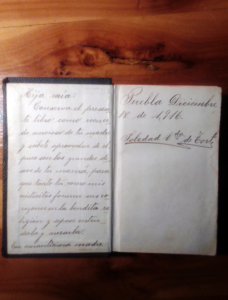 The last book from my father’s library that I have appropriated now that I am boxing them up was written by Martin of Cochem, a German Capuchin theologian and published in Spanish in 1902, under the title Explicación de la santa misa (Explanation of the Holy Mass). The first few pages of the old book, which is in good condition, contain the 1916 words of my great-great-grandmother that we see on the left, addressed to one of my great-grandaunts (or perhaps my great-grandmother?): an unmentioned woman. I was about to put it in the boxes for the dead archive when opening it at random, I saw this passage (my translation):
The last book from my father’s library that I have appropriated now that I am boxing them up was written by Martin of Cochem, a German Capuchin theologian and published in Spanish in 1902, under the title Explicación de la santa misa (Explanation of the Holy Mass). The first few pages of the old book, which is in good condition, contain the 1916 words of my great-great-grandmother that we see on the left, addressed to one of my great-grandaunts (or perhaps my great-grandmother?): an unmentioned woman. I was about to put it in the boxes for the dead archive when opening it at random, I saw this passage (my translation):
Suppose a single man had immolated all the victims sacrificed from the beginning of the world to Jesus Christ; he would undoubtedly have rendered to the Most High a great homage.[1] [page 225]
The Capuchin theologian then quotes St. Thomas Aquinas, and two pages further on he continues:
Let us now study the very nature of the burnt offering [literally, ‘holocausto’ —Ed.], to better understand its excellence. In the Jewish ceremony, the whole victim was consumed by fire.[2]
Naturally, this luxurious hard-cover book, with ecclesiastical Imprimatur and whose typographers who published it, Benziger Establishment, were in Einsiedeln, Switzerland, mentions this barbaric Hebrew practice as something very admirable, although it then informs us that with the sacrifice of Jesus and the new covenant, Christians no longer need such practices.
The book, now more than a century old, is very curious. Although on the spine and the first printed page we read the title Explicación de la santa misa, on the front cover we read something else: Un recuerdo de tu madre (A remembrance of your mother), engraved in golden letters, and below a golden cross.
Do we now understand how parental introjects work?
What moved me to write this entry is something I haven’t talked about. The publishers of the most beautiful books I have ever seen from the point of view of typography and paper quality have been a few luxury books from Catholic publishing houses, like this one that my great-great-grandmother bequeathed to her progeny with the calligraphy of yesteryear.
If I ever had the funds to start a publishing house, I would certainly imitate the beauty of these Catholic publishers of books so carefully produced that they look like jewels—part of the Church’s magic to captivate the faithful! Of course, the message of our books, which can be read from the PDFs in the featured post, would be diametrically opposed to the message of this ancient German theologian. But I think the presentation we see in some of these little books for the faithful is fundamental from the rhetorical viewpoint. Although the book I quote above, for example, is 640 pages long, the high quality of the paper, as well as its elegancy, makes it very compact. It’s destined to be a treasured pocket-book.
The National Socialists did well to wear the most elegant fascist uniforms of all their contemporaries. In times of the Kali Yuga, when we have no power but our ideas, we must strive at least to have them represented as artistically as possible. For the idea with which Rome fights Judea to triumph, it must be presented as eloquently as possible. (Those who haven’t seen the clip of Messala responding to Sextus as real men used to talk, should watch it now.)
__________
[1] “Supongamos que un solo hombre hubiese inmolado todas las víctimas sacrificadas desde el principio del mundo hasta Jesucristo; indudablemente hubiera rendido al Altísimo un grande homenaje”.
[2] “Estudiemos ahora la naturaleza misma del holocausto, para comprender mejor su excelencia. En el ceremonial judío, la víctima entera era consumida por el fuego”.
One reply on “1916 calligraphy”
I just fixed some syntax errors. In Spanish, we call our great-great-grandfathers tatarabuelos, and we call our great-grandfathers bisabuelos: single words that don’t exist in English except adding the prefix ‘great’ to grandfather. Sometimes I get confused with the terms in English, which doesn’t happen to me with these words in Spanish.